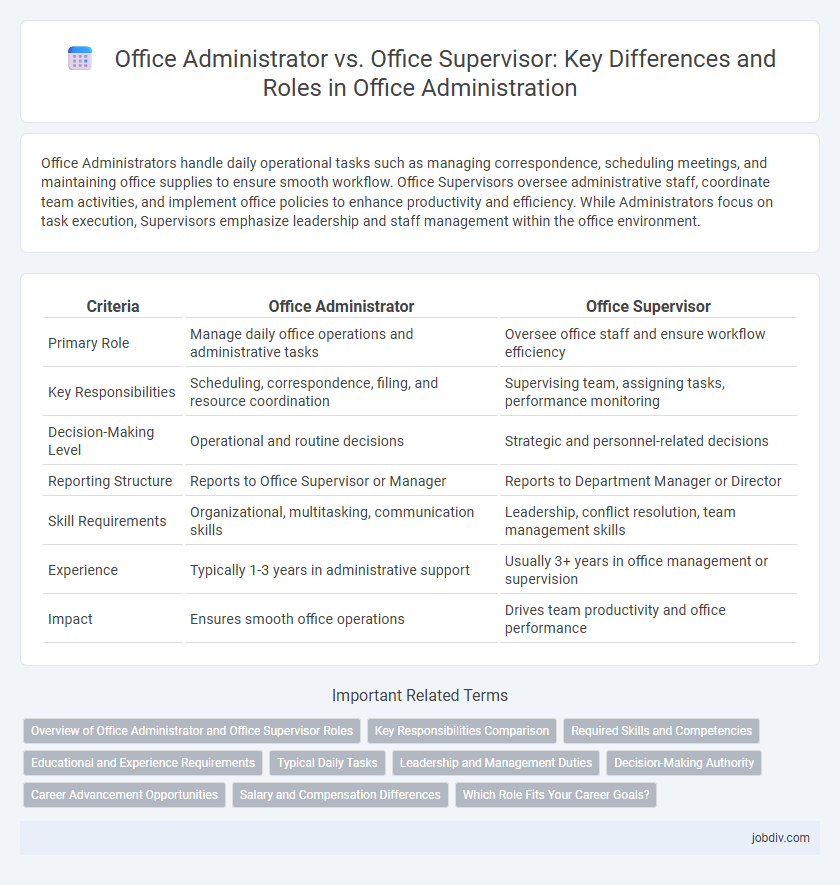Office Administrators handle daily operational tasks such as managing correspondence, scheduling meetings, and maintaining office supplies to ensure smooth workflow. Office Supervisors oversee administrative staff, coordinate team activities, and implement office policies to enhance productivity and efficiency. While Administrators focus on task execution, Supervisors emphasize leadership and staff management within the office environment.
Table of Comparison
| Criteria | Office Administrator | Office Supervisor |
|---|---|---|
| Primary Role | Manage daily office operations and administrative tasks | Oversee office staff and ensure workflow efficiency |
| Key Responsibilities | Scheduling, correspondence, filing, and resource coordination | Supervising team, assigning tasks, performance monitoring |
| Decision-Making Level | Operational and routine decisions | Strategic and personnel-related decisions |
| Reporting Structure | Reports to Office Supervisor or Manager | Reports to Department Manager or Director |
| Skill Requirements | Organizational, multitasking, communication skills | Leadership, conflict resolution, team management skills |
| Experience | Typically 1-3 years in administrative support | Usually 3+ years in office management or supervision |
| Impact | Ensures smooth office operations | Drives team productivity and office performance |
Overview of Office Administrator and Office Supervisor Roles
Office Administrators manage daily office operations, including scheduling, correspondence, and maintaining records, ensuring efficient workflow and support for staff. Office Supervisors oversee teams, coordinate tasks, and enforce office policies to improve productivity and organizational efficiency. Both roles are crucial in maintaining smooth administrative functions but differ in scope and leadership responsibilities.
Key Responsibilities Comparison
Office Administrators primarily manage day-to-day clerical tasks such as scheduling, correspondence, and record-keeping to ensure smooth office operations. Office Supervisors oversee administrative staff, coordinate workflow, and enforce company policies to optimize team productivity and maintain operational standards. Both roles require strong organizational skills, but supervisors focus more on leadership and team management while administrators emphasize administrative support functions.
Required Skills and Competencies
Office Administrators require strong organizational skills, proficiency in office software, and effective communication abilities to manage daily administrative tasks efficiently. Office Supervisors need leadership competencies, including team management, problem-solving, and conflict resolution skills, to oversee staff performance and ensure workflow continuity. Both roles demand attention to detail, time management, and adaptability to support office operations effectively.
Educational and Experience Requirements
Office Administrators typically require a high school diploma or associate degree with 1-3 years of administrative experience, emphasizing organizational and communication skills. Office Supervisors often hold a bachelor's degree and have 3-5 years of progressively responsible experience in office management or related fields, showcasing leadership and team coordination capabilities. Both roles benefit from proficiency in office software, but supervisors are expected to have stronger managerial expertise and decision-making abilities.
Typical Daily Tasks
Office Administrators handle scheduling, correspondence, and managing office supplies to ensure smooth daily operations. Office Supervisors oversee staff performance, coordinate team activities, and implement office policies to maintain productivity. Both roles require strong organizational skills, but Supervisors focus more on leadership and team management.
Leadership and Management Duties
Office Administrators handle day-to-day operational tasks, ensuring smooth workflow and supporting staff with administrative duties, while Office Supervisors focus on leadership by managing teams, assigning responsibilities, and overseeing performance. Office Supervisors play a critical role in strategic planning, conflict resolution, and enforcing company policies to maintain organizational efficiency. Effective leadership from an Office Supervisor complements the detailed task management performed by an Office Administrator, creating a balanced administrative environment.
Decision-Making Authority
Office Administrators typically handle routine decision-making related to daily office operations, managing schedules, and coordinating communication, ensuring smooth workflow execution. Office Supervisors possess higher decision-making authority, including approving budgets, implementing office policies, and resolving complex personnel issues. Their role often encompasses strategic planning and accountability for overall office performance and team management.
Career Advancement Opportunities
Office Administrators often gain foundational skills in organizational management, communication, and scheduling that serve as stepping stones for upward mobility. Office Supervisors typically enjoy enhanced leadership responsibilities, overseeing staff and daily operations, which directly prepare them for higher managerial roles. Career advancement is more rapid for Office Supervisors due to their experience in team coordination and strategic decision-making within administrative settings.
Salary and Compensation Differences
Office Administrators typically earn a salary ranging from $40,000 to $55,000 annually, reflecting their role in handling clerical and organizational tasks. Office Supervisors command higher compensation, often between $50,000 and $70,000, due to their increased responsibilities in managing teams and overseeing daily operations. The salary difference aligns with the supervisory duties and leadership skills required for the Office Supervisor position.
Which Role Fits Your Career Goals?
Office Administrators manage daily operations, handle scheduling, and maintain office systems, ideal for individuals who prefer multitasking and organizational tasks. Office Supervisors oversee teams, coordinate workflow, and implement company policies, suited for those aiming for leadership and managerial responsibilities. Choosing between these roles depends on your career goal of either developing strong administrative skills or advancing into supervisory positions within office management.
Office Administrator vs Office Supervisor Infographic

 jobdiv.com
jobdiv.com